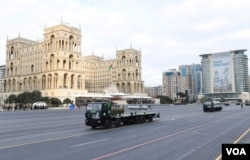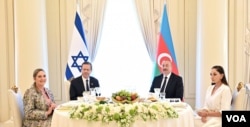The gate outside the Israeli Embassy compound in Azerbaijan on Sunday was festooned with flowers and teddy bears in a show of sympathy to those who died the day before in a surprise attack on Israel by Hamas militants.
On X, formerly known as Twitter, the Israeli ambassador expressed his gratitude “in this dark hour of history.”
"Thank you to the Azerbaijani people for this heartfelt gesture of friendship,” George Deek wrote.
For a country where more than 90% of the population identifies as Muslim, expressions of solidarity with Israel are surprisingly common.
“We strongly condemn the attacks that have resulted in the deaths and injuries of a large number of civilians,” Rasim Musabeyli, a member of the Azerbaijani parliament, told VOA on the day of the attacks that left hundreds dead. “In these difficult times, we stand with Israel."
Since regaining its independence from Moscow in 1991, Azerbaijan’s relationship with Israel has steadily expanded, having solidified into a strategic alliance over the course of the past three decades.
In recent months, Israeli President Isaac Herzog, Foreign Minister Eli Cohen and Defense Minister Yoav Gallant have visited Azerbaijan amid what many observers see as a steady partnership built on security and economic interests.
The volume of the sale of advanced military hardware to Azerbaijan, estimated at billions of dollars, has turned Israel into Azerbaijan’s primary supplier of weapons.
Observers say the military support, consisting of Harop kamikaze strike drones, the Hermes 450, Orbiter reconnaissance drones and a potent air defense system, played an important role in Azerbaijan’s military victory over Armenian forces in the Nagorno-Karabakh enclave in 2020 and beyond.
Azerbaijan, in turn, is Israel’s largest supplier of oil, meeting more than 60% of the Jewish state’s demand for petroleum.
Azerbaijani government officials have walked a fine line in official statements, in a likely attempt not to alienate another powerful ally, Turkey, which has traditionally backed Palestinians and other majority-Muslim countries.
“We condemn violence against civilians in the Israel-Palestine conflict zone,” the Azerbaijani Foreign Ministry said in an official statement that came hours after the attacks. “We express condolences for tragic loss of lives among many civilians both in Israel and Gaza Strip. We call for an urgent de-escalation of the situation.”
Such statements have done little to soothe Iran, Israel’s archnemesis, which has eyed the growing ties between Baku and Tel-Aviv with suspicion and hostility.
In March, Iranian Foreign Ministry spokesman Nasser Kanani characterized the engagement between Israeli and Azerbaijani top diplomats as an attempt “to turn the territory of Azerbaijan into a threat to national security of the Islamic Republic of Iran.”
In January, the Azerbaijani Embassy in Tehran was the target of an armed attack that Azerbaijan’s leadership blamed on the “Iranian establishment.” The attack left the embassy security chief dead and led to the evacuation of the rest of the staff from Iran, bringing Baku-Tehran relations to their lowest point.
Characterizing ties between Azerbaijan and Israel as simply transactional in nature would be inaccurate. Azerbaijan’s cosmopolitan capital of Baku was once home to tens of thousands of Jews who left for a better life in Israel after the dissolution of the Soviet Union, as many retained ties to their native country.
Meanwhile, a thriving community of about 30,000 Jews lives in various parts of Azerbaijan, including Baku and, notably, Red Town in northern Guba province. Azerbaijan's government has touted its treatment of the country’s Jewish minority and generously allocated funds for the restoration of synagogues and sites of Jewish cultural heritage.
It would also be inaccurate to describe all Azerbaijani sentiments as pro-Israeli. A substantial portion of its inhabitants sympathizes with the plight of the Palestinians in the West Bank and Gaza, just as frequently expressing solidarity with their co-religionists.
Human rights activists, wary of Israeli-produced Pegasus spyware that enabled Azerbaijan’s authoritarian government to spy on hundreds of local activists and journalists, have expressed reservations about Israel’s security policy, which they say at times disregards democratic norms and human rights.
“The fact that today this conflict has escalated to a confrontation between the radical fundamentalist Hamas and the far-right government of Israel is the result of the processes of the past 30 years,” activist Rustam Ismayilbeyli told VOA.
Even as the situation escalates in Gaza, Azerbaijan and Israel appear determined to develop the strategic partnership that continues to benefit both.
This story originated in VOA’s Azerbaijani Service.






